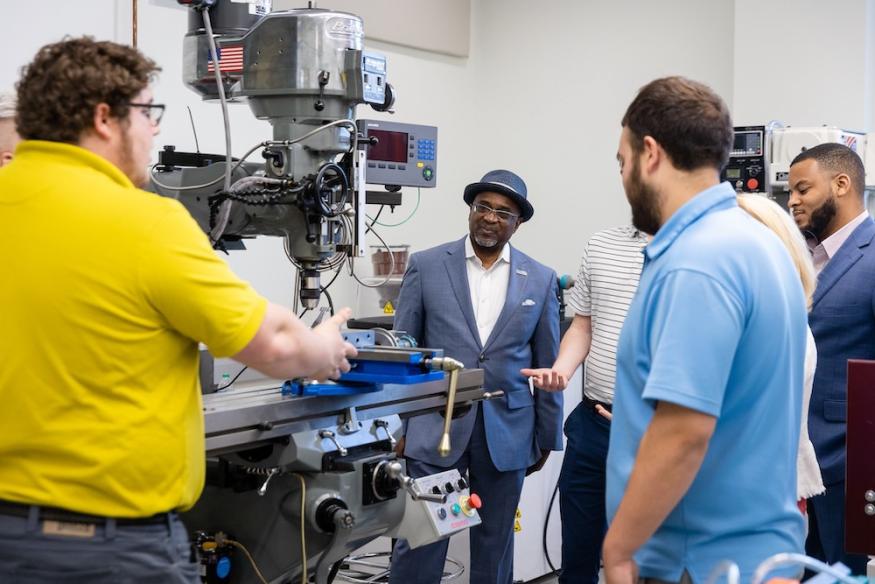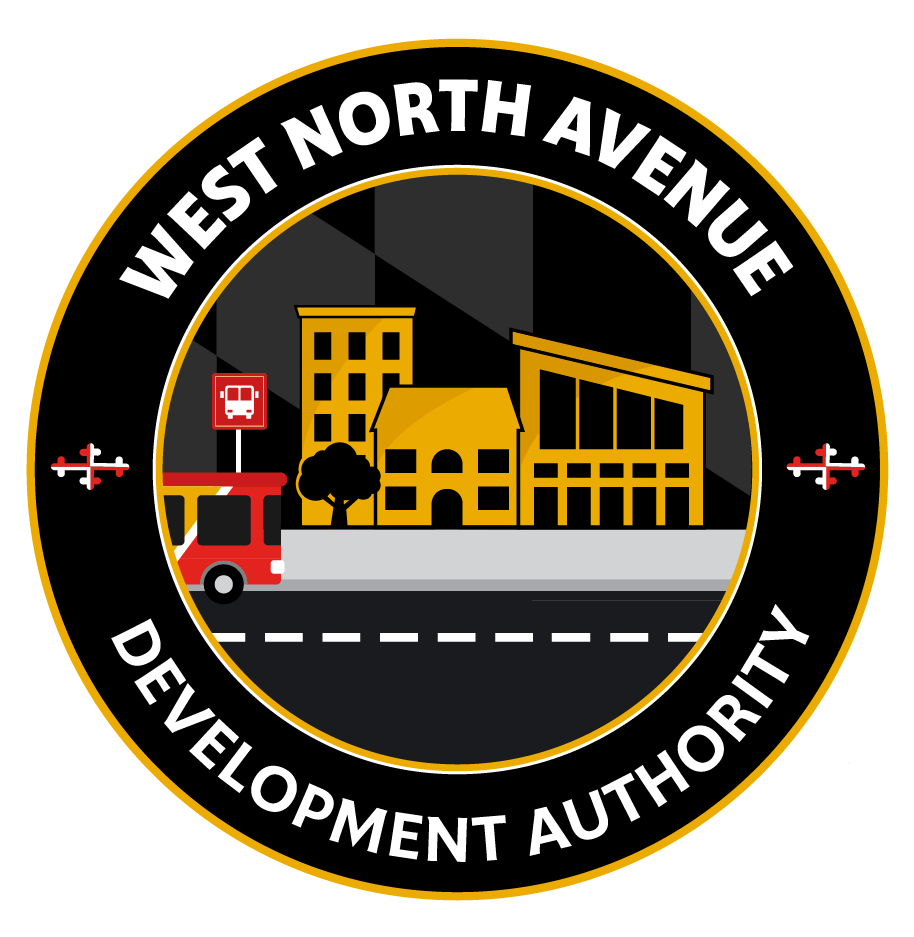Southern Maryland’s autonomy corridor: A center for naval aviation, ‘Top Gun’ engineers and thriving industry-education partnerships

TEDCO CEO TROY LEMAILE-STOVALL (SECOND FROM LEFT) TOURS THE NAWCAD FACILITY.
When “Top Gun: Maverick” was nominated for a Best Visual Effects Oscar, engineers in Southern Maryland had cause for celebration: the Naval Air Warfare Center Aircraft Division (NAWCAD) engineers and technicians had a major role in the film. NAWCAD test engineers helped to customize the film’s aircraft, conducting wind blast tests and doing the camera set-up to ensure excellent shots of the cast of war fighters while also prioritizing actor safety.
As residents of Southern Maryland know, the work at NAWCAD and Naval Air Systems Command (NAVAIR) extends far beyond movie making. Located at Naval Air Station Patuxent River (NAS PAX), NAVAIR and NAWCAD are the United States Navy’s centers for naval aviation. In fact, it’s often said that “anything that takes off and lands from an aircraft carrier and its supported technologies pass through NAVAIR and NAWCAD.”
NAS PAX attracts diverse and highly educated people, as well as over 200 firms in the aviation, unmanned systems and advanced manufacturing spaces that work with them, according to St. Mary’s County. Current data from the county shows that 25,000 civilian, contract and military personnel are working at NAS PAX, the navy’s busiest flight test center.
NAVAIR and NAWCAD are not only the centers for naval aviation in the United States, but they’re also key centerpieces for Maryland’s “autonomy corridor.”
The autonomy corridor is aptly named, given the importance of autonomy to the country’s defense capabilities. Charles Rea, the chief technologist and division head for autonomy and artificial intelligence (AI) at NAWCAD, notes that autonomy allows the Navy to accomplish several key jobs, from logistics to surveillance for search and rescue to using drones to deliver parts between supply ships. Autonomy also helps naval teams parse through data and find new insights.
As the hub of Maryland’s ecosystem, TEDCO celebrates innovation and the development of STEM pipelines across the state, including the important work NAWCAD and NAVAIR are doing in this space.
“Maryland’s economy thrives when every part of the state is engaged in innovation and collaboration,” said Terry Rauh, TEDCO’s chief finance and operation officer. “In Southern Maryland, we have a robust autonomy corridor in which NAWCAD and NAVAIR play an essential role as employers, community partners and close collaborators with local education providers. The end result for Maryland is that we fill the high-skill STEM jobs that fuel our economy with local residents and students. That’s a win for all of us.”
The Navy’s commitment to educational partnerships and innovation
The Navy is active in local education outreach. Patricia Tarleton, the director of Human Resources for NAWCAD, says one of her office’s priorities is to source candidates to support their STEM pipeline community. Noting that her office is “competing for the best,” Tarleton cites internships and strategic educational partnerships as a core part of their outreach efforts.
Such outreach efforts include the 10th annual Science Technology Engineering & Math – Inspiring the Next Generation (STEM-ING) event, where The Patuxent Partnership, St. Mary’s College of Maryland and NAWCAD partnered to connect middle school girls from across the Southern Maryland region with the various opportunities STEM programs present. NAWCAD also partnered with The Patuxent Partnership to host the Spark! Career Fair event in coordination with high schools across the entire tri-county Southern Maryland region. Spark! introduced over 400 diverse students to career opportunities available to them across the region.
Israel Jordan, the director of technical initiatives and the strategy office for NAWCAD’s Webster Outlying Field, conducts outreach in the tri-county Southern Maryland region, with opportunities ranging from programs to get high school students engaged in STEM to internships for University System of Maryland at Southern Maryland (USMSM) students.
“We have a pipeline looking for STEM talent, from engineers to data scientists,” said Jordan, noting the goal is for the students to eventually “apply that knowledge to help us be a leading-edge defense technology industry for the Department of Defense.”
UMD’s MATRIX Lab supports NAWCAD’s needs
NAVAIR and NAWCAD professionals work closely with local higher education partners to fill their current and future workforce. That includes UMD MATRIX Lab, a high-tech research and education facility at USMSM. The lab supports basic, applied and operational autonomous technology research and responds to the needs of local industry, including the Navy. Students, faculty and professionals from NAWCAD utilize the lab’s technology, including an open air-land lab and an outdoor testing area for robotic ground vehicles.
Working with industry and higher education partners at spaces like the UMD MATRIX Lab “allows us to collaboratively find solutions to complex defense problems,” said Charles Rea, chief technologist and division head for autonomy and AI at NAWCAD.
NAWCAD has another unique asset when it comes to recruiting its future engineers: “The direct connection to the war fighter as one of the largest selling features to young engineers and STEM professionals,” said Tarleton.
While movies like “Top Gun” give viewers close to two hours of that experience, a STEM job at NAWCAD offers a lifetime of connection to the war fighter, as well as the chance to be part of a thriving autonomy corridor in Southern Maryland.
To learn more visit https://www.navair.navy.mil/nawcad/index.cfm?fuseaction=home.about_us



